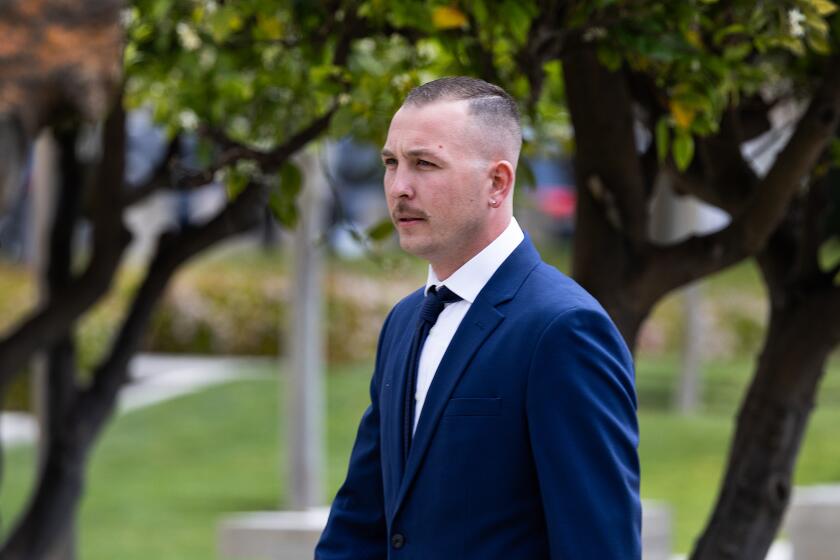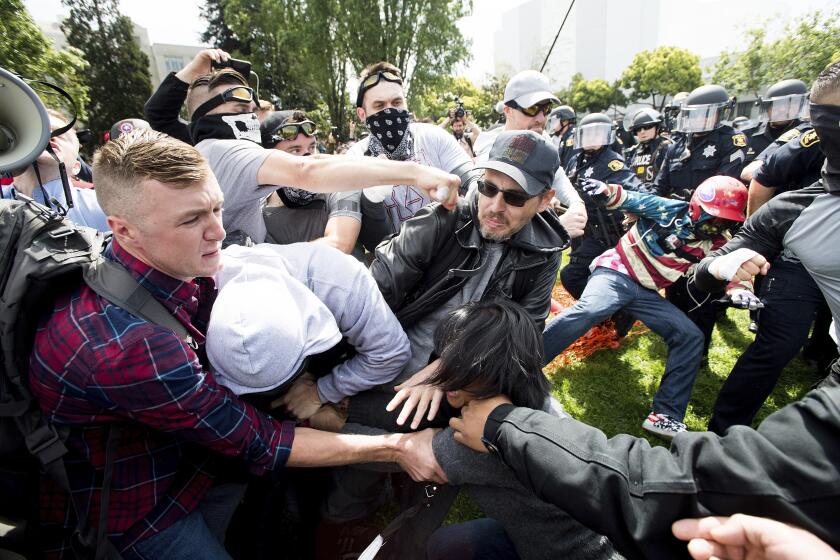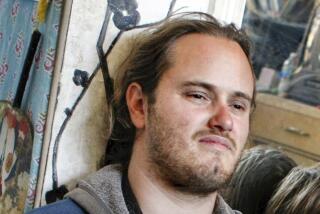Column: He admitted to punching a reporter. A judge wished him “best of luck”
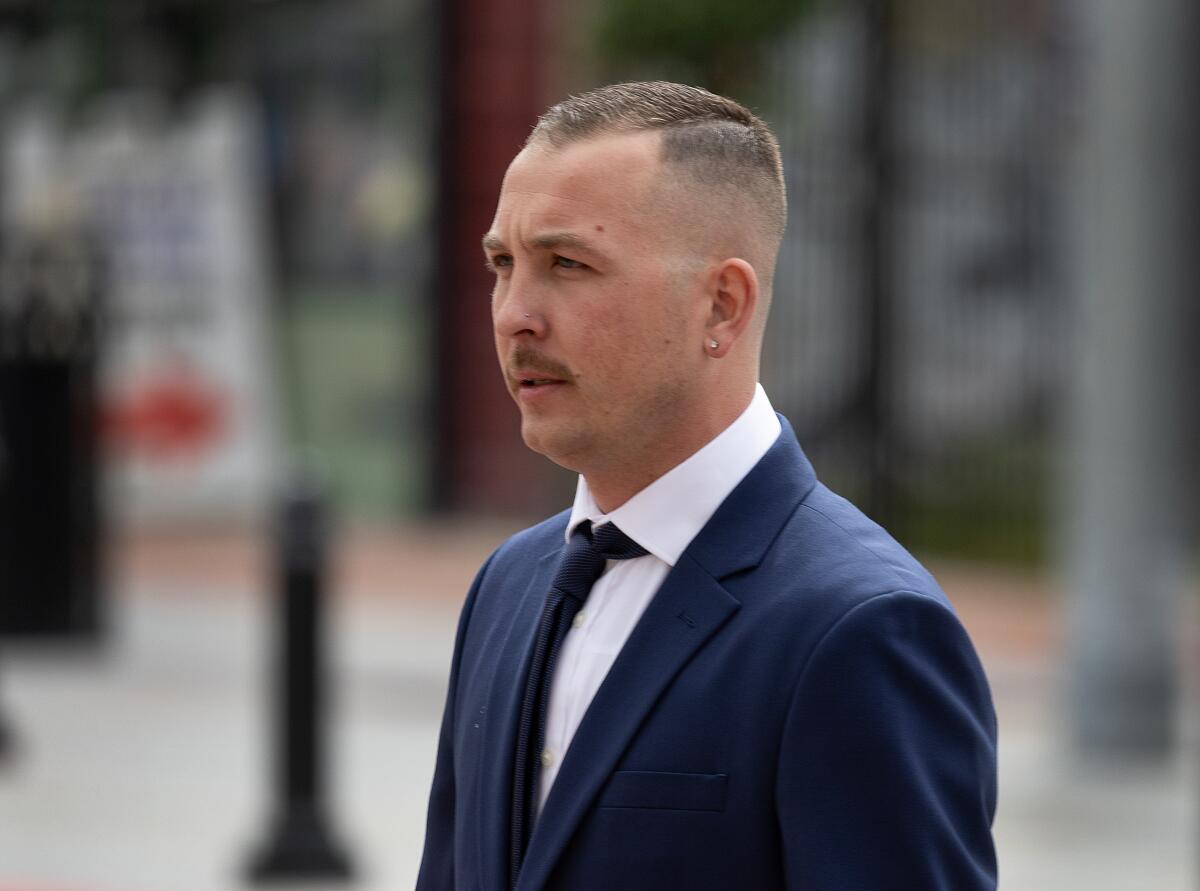
Dressed in a wrinkled blue suit and spotless black Vans, Tyler Laube glanced at me as he walked toward a courtroom on the ninth floor of the Ronald Reagan Federal Building in downtown Santa Ana.
The 27-year-old was there to hear his sentence after pleading guilty to a misdemeanor for repeatedly punching a reporter during a pro-Trump rally at Bolsa Chica State Beach in the spring of 2017.
I was there to hope against hope that Laube wouldn’t get a break yet again.
The reporter he assaulted? Frank Tristan, who was covering the rally for OC Weekly, where I was then editor in chief. As Tristan was being beat up by someone else, Laube rushed him, grabbed him by the jacket and pummeled his head and face before a black-clad protester pepper-sprayed Laube.
The California State Park Police didn’t arrest Laube, who was on probation for his role in an armed robbery in L.A. County. Nor did they detain any of his fellow associates in the white supremacist fight club Rise Above Movement, who had attended the rally with anti-Semitic signs, chased down and stomped on anti-Trump protesters and giddily displayed their mayhem on social media. Instead, rangers handcuffed anti-Trumpers for using pepper spray in self-defense.
Laube’s luck was only beginning.
Tyler Laube pleaded guilty last year to a misdemeanor count tied to his involvement in the Rise Above Movement, a Southern California white supremacist group.
In 2018, federal prosecutors charged him and three other accused Rise Above Movement members — Robert Rundo, Robert Boman and Aaron Eason — with conspiracy to incite riots in Huntington Beach and at other Trump rallies. Laube pleaded guilty to conspiracy to violate the federal riots act and faced up to five years in prison.
A year later, U.S. District Judge Cormac J. Carney dismissed the charges against Rundo, Boman and Eason, claiming they were “unconstitutionally over-broad.” Carney allowed Laube to pull his guilty plea, then dismissed his case as well.
The U.S. 9th Circuit Court of Appeals reversed Carney’s ruling in 2021. This time, Laube pleaded guilty to a misdemeanor charge of interfering with the journalist’s federally-protected rights without causing injury, while Rundo and Boman proceeded with pretrial hearings (Eason had died of lung cancer).
In February, Carney once again tossed out the cases against Rundo and Boman, arguing that prosecutors were picking on them for their far-right beliefs while supposedly ignoring similar incidents by the far left. Would he grant grace to Laube anew?
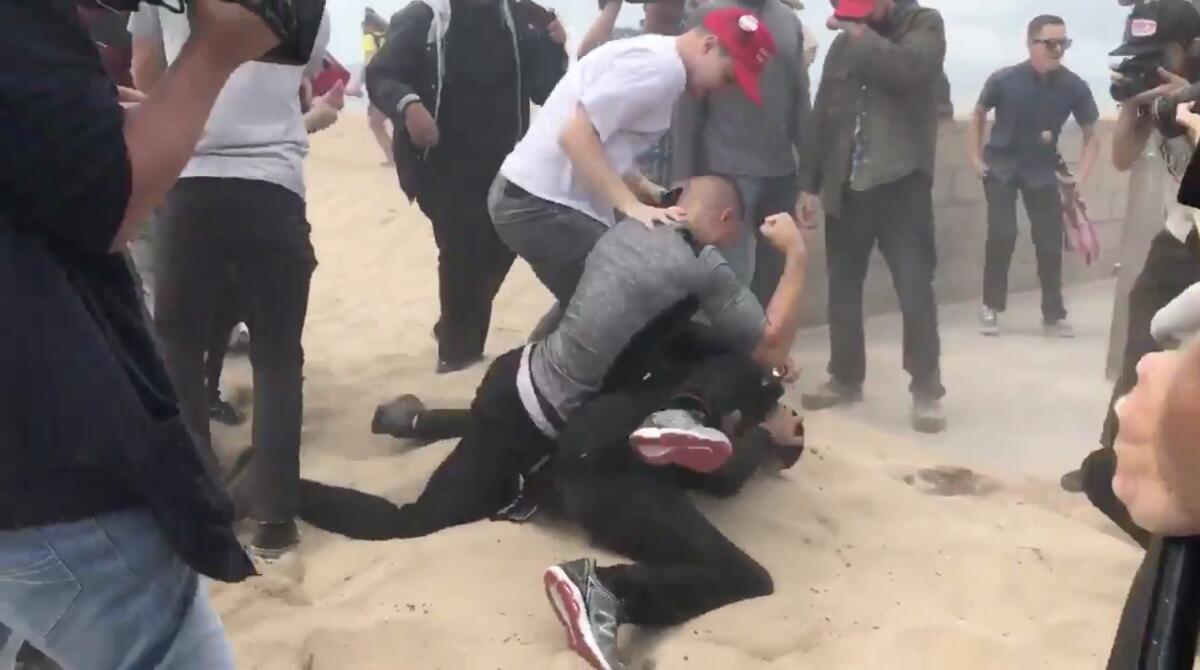
The defendant was chubbier than I remembered, with a mustache that made him look like Lt. Dangle from “Reno 911.” But Laube, a Redondo Beach resident, still wore his hair close-cropped, and his boyish face showed no signs of worry. He joined his attorney, John Neil McNicholas, at the defendant’s table. An aunt and a friend sat on the benches as everyone waited for Carney to start the hearing.
Laube’s saga has long infuriated me — and not just because I knew Tristan. In 2018, Tristan and I appeared togther on a 2018 “Frontline” episode to discuss the Rise Above Movement, but we haven’t talked in years.
In an era where too many politicians declare the press the enemy, someone who had palled around with a white supremacist group had gotten away with physically striking a reporter. In fact, the only person who had been convicted over what happened in Huntington Beach seven years ago was Sacramento resident Jessica Aguilar. An Orange County jury found her guilty in 2019 of misdemeanor battery, and a judge sentenced her to 20 days in jail or 10 days of Caltrans work.
Her crime? Slapping Laube twice after he yelled “F— you, bitch” two times at her.
Would Laube get a slap on the wrist yet again?
Violence erupted at a Make America Great Again rally in Huntington Beach on Saturday after a protester opposed to President Trump allegedly doused a female organizer of the event with pepper spray, sparking a brawl that ended with several arrests.
Prosecutors sought a six-month prison term for Laube, along with a year of supervised release, a $25 special assessment and a $2,000 fine. In a sentencing memo, they blasted Laube’s “failure to appreciate the leniency he has been shown thus far.”
In a letter submitted to Carney, Laube said at the time in his life when he went after Tristan, he had “no real guidance and [a] lack of self-discipline.”
But not anymore: “I’ve used all the pain and suffering I’ve endured in my lifetime and found a positive way to help other people learn from my mistakes” by helping alcoholics become sober.
Carney — a former UCLA star wide receiver nominated to the federal bench by President George W. Bush in 2003 — explained the sentencing guidelines in case he ever had to justify “why there is a disparity” if people felt the sentence was lenient. He then asked prosecutors if they wanted to say anything; they declined.
Next were McNicholas and Laube.
The attorney spun a tale out of a Charles Dickens novel. Laube grew up with an imprisoned father and a “dysfunctional” mother whose boyfriends regularly beat her in front of her son. A best friend died of a drug overdose. Laube became addicted to heroin and alcohol, which fueled a lengthy rap sheet that included driving under the influence, fighting in public, and carrying a switchblade.
“Everything was out of control,” McNicholas proclaimed, and his client “had many more demons to fight” when the federal government filed charges against him.
But Laube was now good, he insisted. Three years sober. Going to school and working full time as an electrician’s apprentice — but his grandpa died on Easter. That’s why his grandma wasn’t in attendance.
“He’s trying to become an example to those with similar problems that he has,” McNicholas concluded. “Things seem to be working well for him right now.”
Laube claimed he “completely broke off” ties with the Rise Above Movement after the Huntington Beach melee and had gone through therapy and counseling. He offered no apology.
“I don’t have room to mess up anymore,” Laube quietly said. “I’m definitely a changed man.”
He sat down. The jeweled studs on his earlobes sparkled. “Good job,” McNicholas whispered.
Carney asked for a few minutes to go to his chambers add a few more lines to a sentencing memorandum. Soon, his clerk passed out copies hot off the printer to reporters.
Laube had gotten off easy yet again.
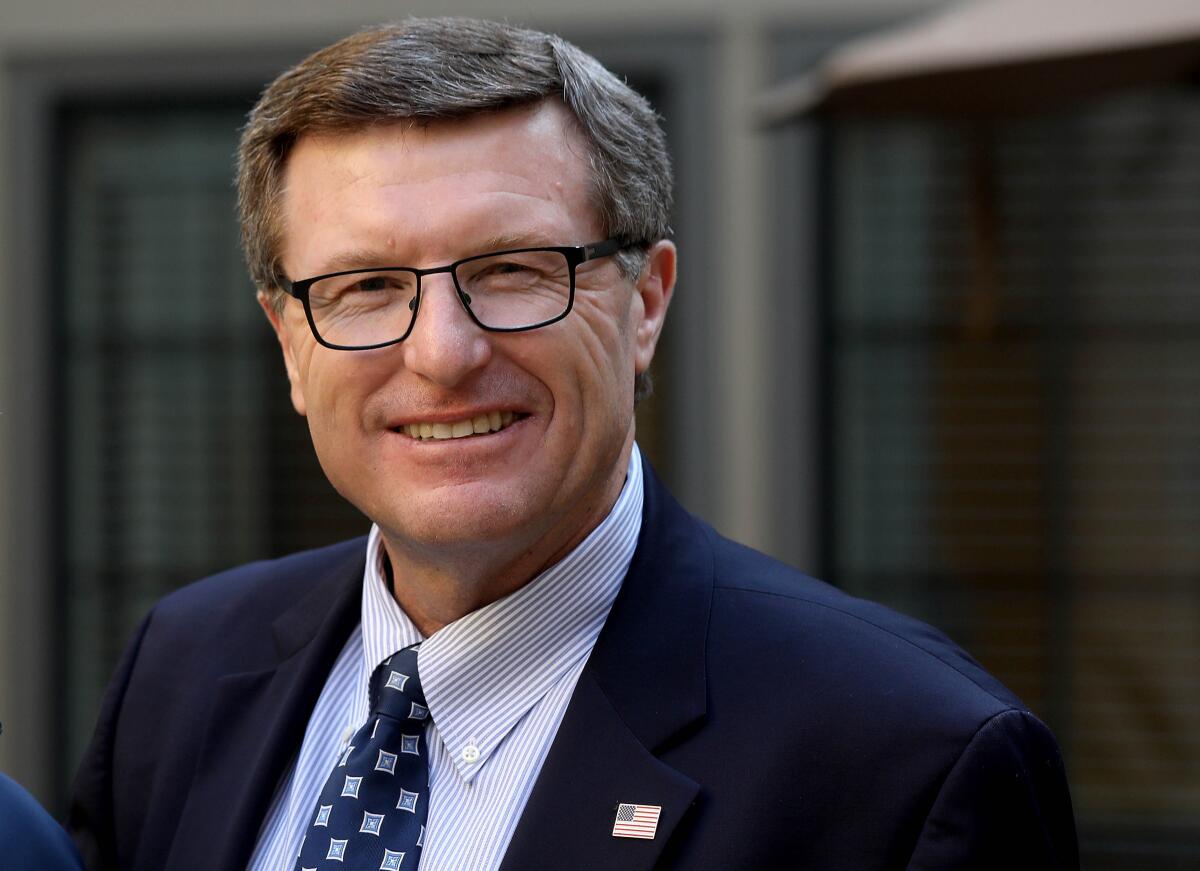
Carney’s memorandum retold Laube’s sad life and contained stills from Laube’s attack on Tristan. Laube maintained that he went after Tristan — who was in his usual outfit of jeans, a black jacket and black hat — because Tristan “was dressed like a member of Antifa and was assisting someone who had harassed a supporter of President Trump,” the judge wrote.
The person Tristan was helping was the OC Weekly photographer who had grabbed an American flag from a woman after she used it to smack another photographer in the face.
“It was wrong to punch a journalist who was not engaging in violence,” Carney continued. “But the scene was chaotic … Mr. Laube himself had already been struck twice.”
The sentence: time served for the 35 days Laube had spent in pretrial custody. One year supervised release. The $25 assessment, due immediately. The $2,000 fine? It would come in monthly installments. And if Laube couldn’t afford his court-ordered substance abuse and mental health programs? He wouldn’t have to pay.
“No doubt,” Carney concluded in his motion, “the government and others will object to the Court’s sentence, focusing entirely on Mr. Laube’s past white supremacist beliefs and ignoring the violent conduct of Antifa and similar groups. But the Court cannot cast aside the Constitution.”
The judge returned to the bench after allowing the media to read through his memorandum. Laube could appeal the sentence if he found it unjust — “it’s not a difficult process,” the judge said, then smiled.
“Sir, I wish you the best of luck,” he said. “You’ve come a long way … keep it up. Be careful who you associate with.”
In his decision, a judge agreed that the alleged white nationalists were being selectively prosecuted instead of ‘far-left extremist groups, such as Antifa.’
I stepped out of the courtroom to wait for Laube and McNicholas. The moment they saw me, their woe-is-Tyler act stopped.
“I don’t want to talk to you,” Laube snapped when I asked how he was feeling. I revealed who I was, in case he didn’t know, and asked if he had ever apologized to Tristan. His soft face had hardened into a scowl.
“I’m not answering any questions,” he huffed, heading to the elevator with his aunt and friend.
Did he still hold white supremacist beliefs? His aunt scoffed.
“Get away from him,” snarled McNicholas as he walked toward Laube.
“The Los Angeles Times is the worst newspaper,” he thundered from the elevator as the doors began to close, “and I’m canceling my subscription!”
I joined them, and they stepped out; so did I. We finally went up to the 10th floor, as I continued to pepper Laube with questions he didn’t even acknowledge. So I turned to McNicholas and asked how he felt about his client getting such a light sentence for what he did to Tristan.
“He didn’t look like a reporter,” McNicholas retorted. But he couldn’t muster a cogent answer when I asked how journalists are supposed to look. I asked again if it was OK that Laube had pummeled a reporter, and McNicholas asked if I had seen the photos in Carney’s sentencing memorandum.
I said I had and that I knew that Laube had called the woman who slapped him a “bitch.”
McNicholas stopped. “Where did you find that?”
When I replied that I had seen video footage, he accused me of being on the side of “leftists” and “antifa,” as Laube’s aunt pointed her smartphone camera at me.
Again, did McNicholas feel it was OK that Laube had attacked a reporter?
“It’s never good to beat up a reporter,” he finally admitted, before accusing Tristan of “supporting antifa.” When I asked for evidence, McNicholas didn’t respond.
He calmed down. “It was an unfortunate incident,” he grumbled, adding it was “regrettable” and that Laube “should’ve never done it.” McNicholas took questions from another reporter, excused himself and went into a conference room to meet Laube.
Laube’s aunt approached me for my email, which I wrote down on a slip of paper. How did she feel about her nephew’s sentence?
She looked at me with a triumphant grin as the conference room door slowly closed.
“I love it.”
More to Read
Sign up for Essential California
The most important California stories and recommendations in your inbox every morning.
You may occasionally receive promotional content from the Los Angeles Times.
